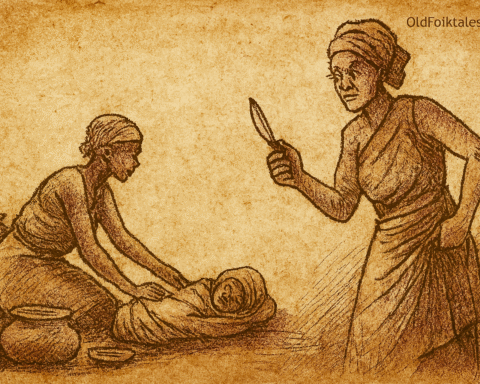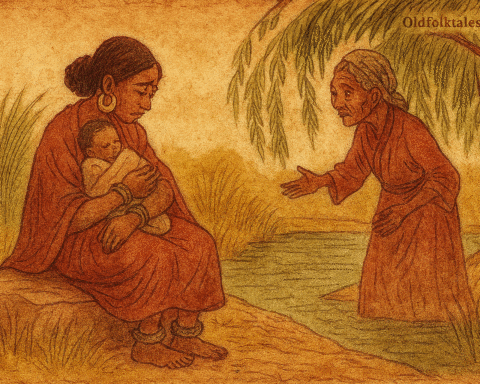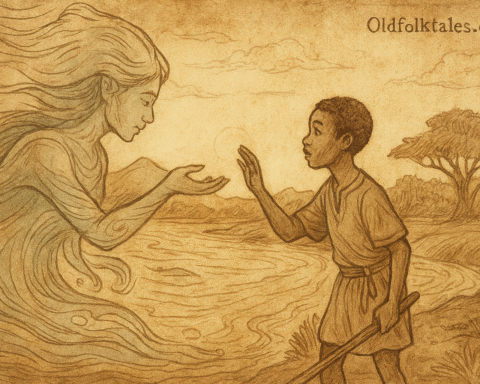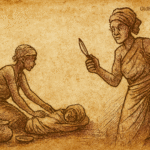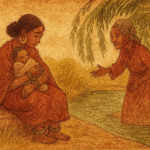Long ago, in the lands of the Dinka people of Sudan, there lived an old man named Chol. He had two wives: one a daughter of a human family, and the other, remarkably, the daughter of a lion. Both wives conceived at the same time and gave birth within days of each other. The lioness-wife delivered first, and the human wife followed soon after. But tragedy struck—after giving birth, the human wife fell ill and died, leaving her newborn son motherless. Only the lioness-wife remained to raise the children.
The two babies were both boys, and in honor of their shared father, they were both named Deng. Though they were half-brothers, they grew together as twins. The lioness suckled them, nursed them through crawling and walking, and raised them with equal care. She bore no other children, and her devotion seemed as tender as any human mother’s. Their father, Chol, remained alive through their youth, watching them grow strong and able to herd sheep, goats, and eventually cattle.
READ: Aluel and the Sun: A Dinka Folktale of Love, Loss, and Betrayal
But fate turned again. Chol died suddenly, leaving the two brothers in the sole care of the lioness. She lived among them like a human, and the household thrived in harmony. The brothers matured, underwent initiation, and became young men. Their bond was unbreakable—where one went, the other followed.
In time, they sought companions and found two young women, both coincidentally named Achol, from neighboring villages. The human-born Deng was betrothed to his Achol, though she was still too young to marry.
One day he told his brother, “I wish to visit Achol.”
Deng of the lioness replied, “Then let us go.”
But his brother insisted, “We cannot both leave. Someone must watch the cattle. I will go today, and tomorrow you may visit your Achol.”
The lioness’s son hesitated. He had noticed unsettling changes in his mother—strange hunger in her eyes when she looked at his brother. “Brother Deng, I fear for you. Mother’s nature may return to her, and she could harm you if you go alone.”
FOLKTALE ANALYSIS: The Tragic Tale of Aluel: Love, Loss, and Pride in Dinka Folklore.
The human Deng laughed. “Do not be foolish! She raised me as her own. Why would she harm me now?”
Against his brother’s warnings, he went alone. On the road, the lioness stealthily followed, slipping through the bush until she revealed herself. The young man laid down his spears, refusing to defend himself.
“Mother,” he said, “if you wish to kill me, I will not resist. How could I raise my hand against the one who nursed me?”
The lioness teased him, pretending innocence, vanishing into the bush only to reappear and stalk him again. But at last, her wild nature overpowered her. She leapt upon him, tore a gland from his groin, and fled into the darkness.
Bleeding and broken, Deng crawled to Achol’s village. His faint voice reached her hut. Alarmed, the girl rushed to him and tended his wound with cotton, water, and care. She begged him to remain until he healed, but pride and honor compelled him to leave before dawn. Limping with a stick, he returned toward home.
Meanwhile, Deng of the lioness, sensing disaster, confronted his mother: “If Deng is harmed, I will hold you accountable.” She denied all guilt, but his suspicion grew. At daybreak, he searched for his brother.
The human Deng, ashamed of his condition, tried to hide. Yet when his brother uncovered him, the terrible wound told the truth. Furious, Deng of the lioness stormed to their mother: “Restore him, or I will kill you!” Terrified, the lioness relented. She replaced the stolen gland, healing Deng as though nothing had happened.
But the trust was broken. Deng of the lioness told his brother, “Our father is gone, your mother is gone, and mine has become a beast. We cannot let her live.”
The human Deng resisted, unwilling to kill the one who had raised them, but at last he relented. One night, Deng of the lioness set fire to her hut and offered a black ram in sacrifice to cleanse the curse of murder. The lioness burned to death.
Their peace did not last. Word of her death reached her brother, the lion Miyar. Seeking vengeance, he came to the village. But Deng of the lioness ambushed him at a pool, killing him with a spear and another black ram sacrifice. Before dying, Miyar warned: “My son will avenge me.”
The brothers knew the danger. After marrying their Achols, they prepared for battle against Miyar’s son. Their wives gave them rings: “If the rings rust, we are dead; if not, we live.” The brothers departed, singing a duet that became their battle-song.
They found Miyar’s camp, challenged him openly, and wrestled. Deng of the lioness threw his cousin down, and his brother struck the killing blow. Panic swept the lion camp. The hornless cattle transformed into lions and fled, but the horned cattle remained. Two emaciated human children, captives of the lions, were freed by the brothers.
Driving the cattle and guiding the children, the brothers returned home, singing their song. Their wives, who had mourned them as dead, heard the voices in the night and rejoiced. The brothers prospered, adding the cattle to their wealth, restoring the boy to his family, and raising the girl as their sister until her marriage.
Thus, through betrayal, survival, and vengeance, the brothers triumphed over lions and misfortune, bound always by loyalty to one another.
Moral of the Story
The tale of Deng and his brother teaches the dangers of jealousy, the power of brotherhood, and the importance of courage in facing betrayal. Even when raised in love, true nature cannot always be denied, but unity and loyalty can overcome even the most fearsome trials.
Knowledge Check
1. Who was Chol’s second wife and what made her unique?
Chol’s second wife was a lioness, the daughter of a lion, who raised both sons after the human wife’s death.
2. Why did Deng of the lioness fear for his brother’s safety?
He noticed their mother showing dangerous signs of reverting to her lion nature and feared she might harm the human Deng.
3. What did the lioness do to harm her stepson?
She tore a gland from his groin, leaving him wounded and bleeding.
4. How did the brothers finally deal with their lioness mother?
Deng of the lioness burned her in her hut, offering a black ram to cleanse the curse of murder.
5. What was the purpose of the brothers’ battle-song?
It identified them to their wives and announced their trials and victories during their journey to face the lions.
6. What became of the human children rescued from the lion camp?
The boy was returned to his family, while the girl was adopted by the brothers and later married, bringing wealth to the family.
Source: Dinka folktale, South Sudan

